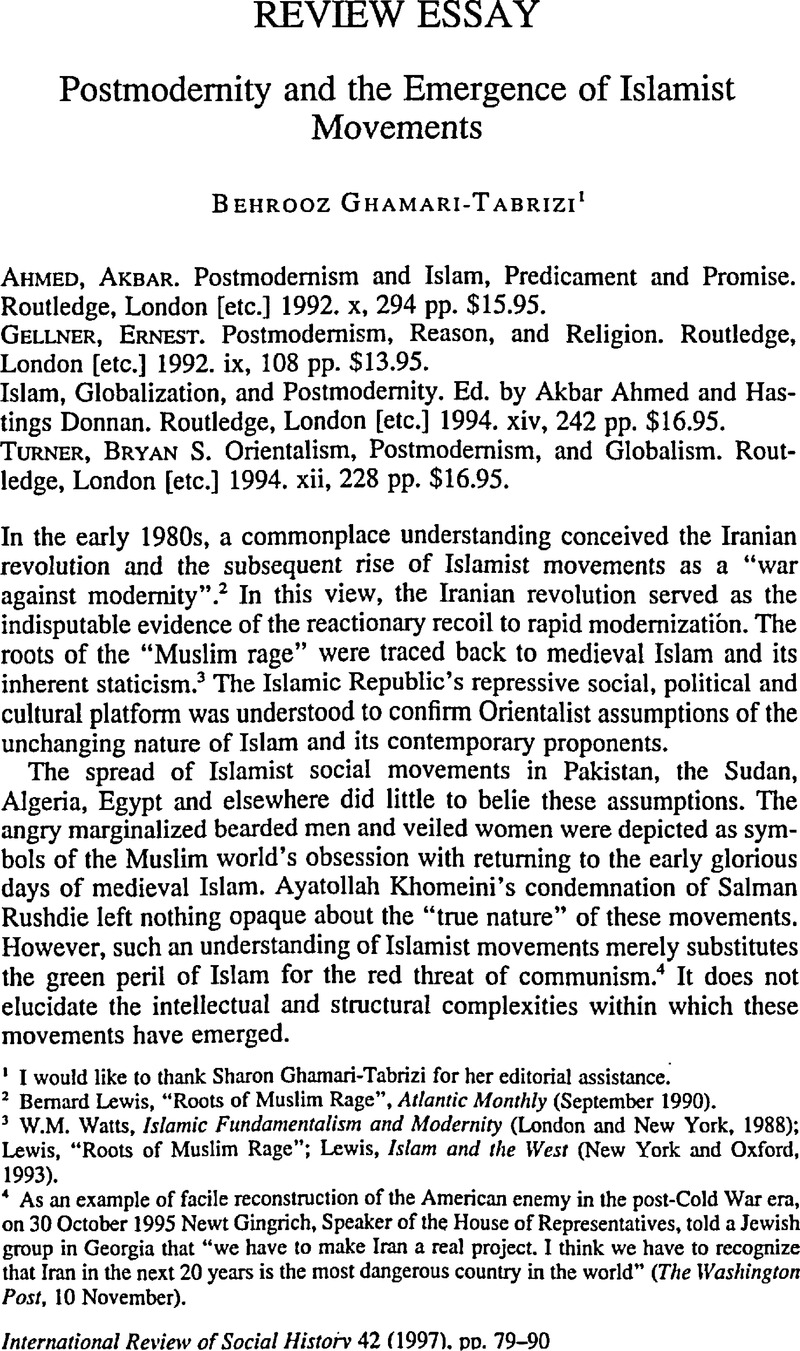Published online by Cambridge University Press: 20 February 2009

2 Lewis, Bernard, “Roots of Muslim Rage”, Atlantic Monthly (09 1990)Google Scholar.
3 watts, W.M., Islamic Fundamentalism and Modernity (London and New York, 1988)Google Scholar; Lewis, “Roots of Muslim Rage” Lewis, , Islam and the West (New York and Oxford, 1993)Google Scholar.
4 As an example of facile reconstruction of the American enemy in the post-Cold War era, on 30 October 1995 Newt Gingrich, Speaker of the House of Representatives, told a Jewish group in Georgia that “we have to make Iran a real project. I think we have to recognize that Iran in the next 20 years is the most dangerous country in the world” (The Washington Post, 10 November).
5 Lughod, Ibrahim Abu, “Retreat from the Secular Path? Islamic Dilemmas of Arab Politics”, The Review of Politics, 28 (1966), pp. 447–476CrossRefGoogle Scholar; Ayubi, Nazih, Political Islam: Religion and Politics in the Arab World (London and New York, 1991)Google Scholar; Esposito, John, The Islamic Threat, Myth or Reality (New York and Oxford, 1992)Google Scholar; Fischer, Michael, “Islam and the Revolt of the Petit Bourgeoisie”, Daedalus (Winter 1982), pp. 101–125Google Scholar; Roy, Olivier, The Failure of Political Islam (Cambridge, MA, 1994)Google Scholar; Voll, John Obert, Islam: Continuity and Change in the Modern World (Boulder, CO, 1994)Google Scholar; Zubaida, Sami, Islam, the People and the State (London, 1989)Google Scholar.
6 Offe, Claus, Disorganized Capitalism: Contemporary Transformations of Work and Politics (Cambridge, 1985)Google Scholar; Lash, Scott and Urry, John, The End of Organized Capitalism (Cambridge, 1987)Google Scholar.
7 Beck, Ulrich, Risk Society (London, 1992)Google Scholar.
8 Abdel-Khalek, Gouda, “Looking Outside, or Turning Northwest? On the Meaning and External Dimension of Egypt's Infitah 1971–1980”, Social Problems, 28 (1981), pp. 394–408CrossRefGoogle Scholar; Ali E. Dessouki, “Policy Making in Egypt: A Case Study of the Open Door Economic Policy”, ibid, pp. 410–416; Raymond William Baker, “Sadat's Open Doon Opposition from Within”, ibid., pp. 378–384.
9 Gilsenan, Michael, Muslim Society (Cambridge, 1981), p. 15Google Scholar.
10 Harvey, David, The Condition of Postmodernity (Cambridge and Oxford, 1989)Google Scholar; Lash, Scott, Sociology of Postmodernism (London, 1990)Google Scholar.
11 For a critique of Gellner's bifurcation of Islam into High and Folk see ubaida, Sami, “Is There a Muslim Society?”, Economy and Society, 24 (1995)Google Scholar.